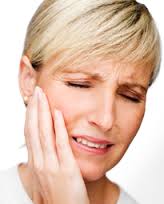
TMJ problems are a common, sometimes painful issue that many people face. They are often misunderstood and even misdiagnosed, but fortunately, they can often be easily treated.
First, it is important to understand what the TMJ is. The TMJ or temporomandibular joint is the joint that allows the jaw to move. It is a very complicated joint which can both rotate or “hinge” and also move forward and back.
When people talk about “having TMJ”, sometimes they truly have a problem with the joint itself. Often, however, the TMJ problems that patients have are actually related to jaw muscles rather than the jaw joint.
Muscle problems can be caused by several things such as clenching and grinding of teeth during the day or night, problems with the bite or the teeth not fitting together well. Internal joint problems can be caused by some of the same things as well as by injuries to the joint such as car accidents.
The first step a patient should take to treat a potential TMJ problem is to have a thorough dental exam that includes a joint evaluation. Our Greeneville dentists at Rogers Family Dental are trained in special techniques to evaluate and correctly diagnose TMJ problems.
Treatment of most TMJ problems involves special dental appliances that are made to prevent jaw muscles and joints from being overworked or overused. These appliances also can be used even if a patient’s bite is imperfect.
If the problem is more complex, our dentists may recommend treatments such as physical therapy, medications, orthodontics, and for rare extreme cases, evaluation using three-dimensional imaging such as CT scans or MRI’s and evaluation by surgical specialists.
One of the main values of a quality general dental office who treats TMJ problems is knowing what we can easily treat and what is a more complex problem requiring evaluation by specialists and advanced imaging. Our dentists are specially trained to make sure you get the best possible treatment.
At home, there are things you can do to prevent TMJ problems from getting worse. Strategies include avoiding repetitive movements of the jaw such as gum chewing and resting the jaw. Follow our dentists recommendations to make sure you are not doing things that might be making your jaw problem worse!